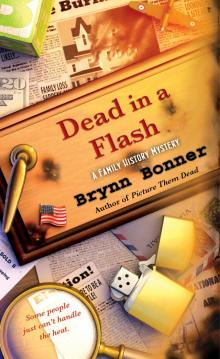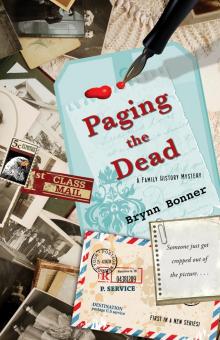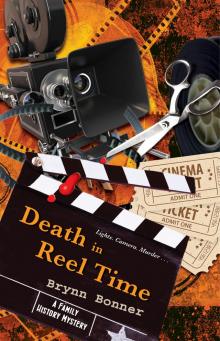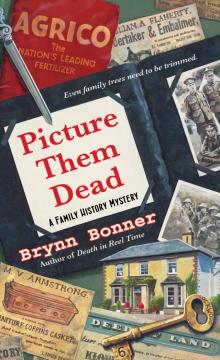- Home
- Brynn Bonner
Death in Reel Time Page 9
Death in Reel Time Read online
Page 9
“Sins of the fathers, or grandfathers,” I said. “You’d be surprised how deep family guilt can go. How ’bout you, Tony? Tell me about your family.”
“Not a whole lot to tell,” he said. “Never had a dad in the picture. My mom did her best, but she struggled. She didn’t have much education and she was young when she had me. I know she loved me and that counted for a whole lot, but I also grew up knowing everything could fall down around our ears at any given second. We moved around a lot and then she got sick. She didn’t go to the doctor right away, ’cause we didn’t have health insurance. She was working nights as a checker at a mini-mart. The old woman who lived upstairs looked after me. Her name was Mrs. Collier. She tried, too, but she was an old, tired woman trying to look after a young, spunky kid. It got harder and harder for me to be in that apartment; it smelled like old lady lotion and disappointment. I slept on the couch in her living room and she slept like the dead, so I started sneaking out at night and just wandering around.”
“And then?” I prodded.
“Mom died and I went into the system,” Tony said, his voice matter-of-fact.
“I’m sorry, Tony,” I said. “I lost my mother when I was in high school, but I was lucky. I still had my dad, for a few more years anyway. How old were you?”
“Just going into my freshman year,” he said.
“So you were in foster homes after that?”
“Yep. I went through a few before I got lucky, too, and ended up in a good one.”
“Here in Morningside?”
“Yep. The Robertsons.”
“I know the Robertsons,” I said. “How is it I never knew you?”
Tony shrugged. “I heard people talk about you, but you were away at college. Grad school, maybe?”
“Knowing Michelle and Eric Robertson, I don’t think I have to ask if they were kind to you.”
“They were,” Tony said. “They are. I still see them a lot. They care about me and I care about them, but it’s not the same as blood family.”
“Blood family’s not always a lovefest,” I said. “But I know what you mean.”
“I gave Michelle and Eric a lot of trouble,” Tony said. “That’s my biggest regret. I wish I could go back and do it over. But I was lost when I went to live with them. And if it hadn’t been for them and for Beth I’d have gone under. She saved me. Wish I could do the same for her.”
“Does Beth need saving?” I asked.
Tony hesitated and I took my eyes off the road just long enough to glimpse his pained expression.
“She might.”
* * *
Charlie Martin didn’t even try to hide his disappointment that I’d come in Beth’s stead. But as we talked I came to understand why people found him interesting. He had the air of someone who’d seen about everything there was to see and none of it surprised him, upset him, disappointed him—or pleased him.
When he learned what I do for a living he pursed his lips and hunched a shoulder. “Needn’t waste time on me,” he said. “I never had much family to begin with and such as it was, they’re all gone now.”
“Where were you born, Mr. Martin?” I asked. “Are you a North Carolina native?”
Charlie gave me an appraising glance. “What’s that got to do with the price of eggs?”
“Nothing,” I said, taken aback by his response. “I was just wondering. You don’t have much of a southern accent.”
“I was born in North Carolina, near a little settlement town called Murdock, in 1918. Born there, half raised up there. But after my folks died I hit the road. That was a long time ago and I’ve been here and there and everywhere since, so I probably talk a little bit like everybody I’ve ever been around. Even picked up a little German and French back during the war, but I’ve forgot most of that.”
“Murdock is pretty near Crawford. Did you know any of Olivia’s people? The Hargetts?”
“Never knew anybody by that name,” Charlie said. “Beth asked me that already. Like I say, I was gone from there when I was just a kid.”
Nineteen eighteen made Charlie Martin ninety-four years old. He was remarkably spry and his mental faculties seemed sharp.
In my job I strive to put the events of an individual’s life in the context of the times, and it’s become an automatic response for me over the years. The mention of a date triggers a list, and sometimes a sort of dreamy period ambience in my head.
“Nineteen eighteen,” I said, musing. “Lots of brutal battles. World War One ended, only to have Russians start up a civil war. A flu pandemic killed millions. Gandhi advocated for poor farmers, the Great Train Wreck in Tennessee killed a bunch of people, the Red Sox won the World Series, Houdini performed his vanishing elephant act, and Charlie Chaplin was onscreen as the Tramp in A Dog’s Life, costarring a little dog named Scraps.”
“Sounds about right,” Charlie said, “but I was born so far out in the backwoods, not much of that would have been known about by my people.”
“Did you have siblings?” I asked, and Tony gave me a look that let me know I needed to move things along.
“It was just me,” Charlie said. “Guess that makes me the stump of my family tree. When I go the line goes.”
“Any cousins?” I asked, and earned another exasperated look from Tony.
“Don’t rightly know,” Charlie said. “Like I say, my folks weren’t much on family.”
“I’m told you rode the rails for a while after you left North Carolina,” I said, hoping to nudge him forward a few years.
That got him going. “Oh yeah, boy. It was an adventure back in those times. Not like during the worst of the Depression when the trains and camps were crowded over with desperate men. By the time I started hopping trains even the railroad bulls had let up a little. You still had to worry about getting kicked off the train, but not so much about getting clubbed or shot dead.”
I risked another scolding look from Tony, my curiosity about Charlie’s hobo days tingling like an itch. I’d read about hobo culture, but never had an opportunity to talk to anyone who’d actually lived it.
“Did people go solo, or travel together in groups?”
“Both,” Charlie said. “Some kept to themselves ’cause they were just that type, but others had somebody watching their back. Me and a buddy left out at the same time and we pretty much stayed together the whole time we were travelin’.”
“What was your friend’s name?” I asked.
“Hershel,” Charlie said. “Hershel Tillett. We worked when we could find it and pilfered when we couldn’t. Saw twenty-seven states. Then Hershel caught the patriotic bug and we joined up together to go fight the Nazis.”
“Did you stay together during the war?” I asked, and got an approving nod from Tony.
“Through training,” Charlie said. “And we went to the same unit, but Hershel got wounded bad straight off and shipped back home.”
“Did you keep in touch?”
“For a while, but you know how it is. You drift. I imagine he’s long dead now. Not many of us left.”
I could tell Tony was pleased when this segued into a discussion of other war buddies. Charlie hesitated now and again when the memories seemed too painful, and so I’d back off to ask questions about his leave time or what he’d been able to see of France or some more adventurous aspects of his time overseas. After about an hour Tony called it a wrap.
“You’re pretty slick, young lady,” Charlie said. “I didn’t mean to get off on all that rigmarole.”
“Think of it as your gift to posterity, Mr. Martin,” Tony said. “Like you said, there’s not many of you around who’ve lived through the things you’ve seen.”
Charlie nodded, but his thoughts seemed to be on other things. “How is Beth getting on?” he asked.
“She’s terribly sad,” I said, “and I think maybe she’s still in shock. But she’ll be okay in the end.”
Charlie puckered his lips and looked down at his hands. “I surely hope
so. I hate that she has to go through this.” His voice went raspy and low. “She’s a fine young woman.”
* * *
Tony was stoked. “That was fantastic,” he said as I backed out of the parking space in front of Charlie’s apartment. “You won him over. I woulda never thunk it! I didn’t believe anybody but Beth could get him to open up.”
“Maybe because I was genuinely interested,” I said. “You and Beth were right, he’s got some amazing stories. He’d be a good subject for a whole film.”
“I’ve been thinking the same thing—a short, anyway. Want to get a cup of coffee and talk about it?”
I figured it was part of Tony’s creative process to bounce ideas off someone, and I had no big plans for the evening. “Sure, I’ll just call Esme to let her know I’ll be late for supper,” I said, stopping in the parking lot to dig my cell out of my bag.
“No problem here,” Esme said after I’d told her the situation. “I’m going out for a bite to eat with Denny so you’re on your own anyway. There’s lentil soup in the fridge and plenty of salad makings.”
“Great,” I said, trying to feign enthusiasm.
“Sophreena,” Esme said. “I know you’re right now thinking you’ll have an apple fritter with your coffee at Top o’ the Morning and call it supper.”
I sighed. “Stay outta my head, Esme. I’ll see you later tonight.”
“How did you and Esme meet?” Tony asked. “You two seem like kinda unlikely business partners—or friends, either, for that matter.”
“You’re not the first to say so,” I said, pulling out of the parking lot and onto River Road. I gave him the oft-repeated story of how we’d met. “It was down in Louisiana and I was interviewing Esme’s mother, who had been a domestic for the family I was tracing. We got off to sort of a rocky start, but over time we came to appreciate one another and the rest is history.”
Of course, it was the rest that was the juicy part, the part that was Esme’s very special contribution to the business. I wasn’t about to let on about that to a filmmaker.
Top o’ the Morning was busy. After-work coffee-daters took up most of the tables inside. Thankful for the unusually warm October day, I snagged one of the small tables that had been jammed into a space outside, partially obstructing the sidewalk and the alley, which I was sure violated some kind of town ordinance. No one had ever complained, though. Morningsiders were serious about their caffeine and there’d be marches on town hall if a bureaucrat messed with Top o’ the Morning. Tony went in to place our order while I guarded the table. I couldn’t wait to tell Esme she’d been wrong and that I’d gotten a tuna sandwich with my coffee. She didn’t need to know it was in addition to the apple fritter.
I stowed my bag under the table and glanced around, prepared to give a friendly nod to those I knew. Bonnie Foster sat at the table directly behind me with a man I didn’t know. She glanced up and gave me a smile that seemed to take effort, then turned back to the man, her eyes locked on his face like a laser. I wondered if this guy had anything to do with the business. Somehow he looked the expensive-suit lawyer type, even though he was dressed in khakis and a polo shirt.
I tried not to eavesdrop, really I did, but Bonnie was getting agitated as they spoke and finally she thumped both fists on the table and said, “Alan, give it up. She’s got to face it. It’s all bound to come out.”
“Not if we keep our mouths shut,” he snapped. “You don’t know it all. And anyway, you’re as guilty as I am about all this, so don’t go all high-and-mighty on me.”
It was all I could do to resist spinning around to gape at them. This had to be Blaine’s buddy, Alan. A cadre of Blaine’s fraternity brothers had attended the funeral but I hadn’t sorted out names and faces.
Alan made shushing noises, though he’d been the one who’d raised his voice. I couldn’t hear what he said after that but his tone was conciliatory. I heard the scrape of a chair and glanced out of the corner of my eyes to see Alan standing. “Let’s move over there,” he said to Bonnie, pointing to a more secluded table along the alleyway that led to the parking lot. “The sun’s in my eyes.”
In fact, though the late afternoon sun was slanting in through the alleyway, it was bathing everything in a soft golden aura, so unless the guy had Dracula-level light sensitivity, he was really looking to get away from prying ears—mine. A pity. Just when it was getting interesting. What were they guilty of? Not murder, surely. That wouldn’t be the kind of thing they’d be talking about sitting out in the open at a coffee shop. Plus, they both seemed genuinely saddened by Blaine’s death.
Tony returned with our order and we spent the next half hour brainstorming the concept of a film on Charlie Martin’s checkered life. Tony kept saying we could take this or that approach and finally I asked. “Do you mean that as the royal we?”
He looked startled by the question. “Guess I was taking a lot for granted,” he said. “Things just went so well today and you seemed really into it. I just thought . . .” His voice trailed off and he put his hands out, palms up.
“Well, I’m not saying I’m not interested,” I said, popping the last bite of apple fritter into my mouth. “The only thing is, Esme and I have jobs lined up over the next six months. I don’t know how much time I could give it.”
“Okay, let’s be honest here,” Tony said. “The guy’s ninety-plus. If we don’t get what we need soon it won’t get got.”
“Is there a market for a film like this?”
“Absolutely,” Tony said. “Plenty of places would be interested. Historical museums, war memorials, places like that. Lots of outlets, just not much money. I was sort of thinking whatever we could get after expenses would go to Charlie. The way he lives, it looks like he could use it.”
I sighed. “Well, if we can work out the timing I’m on board, but this is going to have to be my last pro bono project for a while. I’ve got to make a living.”
“I hear ya,” Tony said. “I love filmmaking, but I can’t spend my life freeloading off friends.” He glanced down the street and suddenly grew intent. “Look at that sunset,” he said, half rising from his chair. “That angle coming in on the dome of the town hall is perfect. I’ll be right back; I need to get this shot.”
I looked over the notes I’d taken while we were talking and suddenly I became aware of someone standing by my table.
“Hey, Sophreena, how’s it going?”
Peyton Branch looked like he hadn’t slept in days. His hair was mussed, he had bags under his eyes, and his skin looked sallow. He stood there with his hands jammed into his pockets and looked as if just existing was a chore.
“Peyton, how are you?” I asked. “I haven’t had a chance to talk with you since, you know, what happened to Blaine. I’m so sorry.”
“Yeah, me, too,” he said. “It’s not real yet.”
“Sit down,” I said, pointing to the chair Tony had vacated.
“Just for a minute.” He perched on the edge of the seat, his leg bouncing as if he had to power himself to keep functioning. “How’s Beth? You seen her?”
“Earlier today. She’s struggling, but Olivia’s taking good care of her. She just needs time.”
“Yeah, time,” Peyton said, huffing out each word. “That’s what Beth always needed. Time.”
“I don’t know what you’re trying to say, Peyton.” I studied his face, but found no answers there.
He puffed his lips out like a tuba player then let out a long breath. “Neither do I,” he said, finally. “I need a cup of coffee.” He gave me a wry smile and rose, patting my shoulder. “Good to see you, Sophreena. If you see Beth, tell her I know—” He stopped as he glanced over and spotted Alan and Bonnie. “Never mind. Just say I hope she gets what she deserves. That’s the message. Just say I want her to get what she deserves.”
He turned and walked away, leaving me with a tuna sandwich/apple fritter lump in my stomach.
Tony returned, excited that he’d captured the shot he’d b
een hoping for. “I’ve been chasing a good sunset for days, but the weather hasn’t been cooperating.” He settled back at the table, took a sip of his cold coffee, and made a face.
We talked a few more minutes and set up some tentative dates for filming more interviews with Charlie, but I was distracted.
I noticed Peyton come out of the shop and approach the table where Bonnie and Alan had just stood, readying to leave. They had a quick conversation that looked intense from where I was sitting. Bonnie swiped her hands in front of her as if cutting them both off, then she headed for the street, where she’d parked her car. Alan and Peyton were still talking, arguing, it would seem. They exchanged a few more words then headed for the back parking lot.
“This may all be for nothin’,” Tony said, snapping me back. He stowed his notebook in his backpack. “I don’t even know if I’ll be able to talk Charlie into it. He wasn’t really keen on talking to me in the first place. He only did it for Beth.”
I hugged my sweater around me and rubbed my arms. “Okay, well, you work on that. And speaking of the weather not cooperating, without the sun it’s getting cold. Let’s go.”
We gathered our cups and napkins and deposited them in the trash, then headed for my car. As we rounded the corner of the building I heard a thump and a grunt and saw Alan slam Peyton against the brick wall, holding him by the front of his shirt.
“Don’t you get it? Keep your mouth shut,” Alan said, through clenched teeth. “You want her to have this on her—”
He turned and saw Tony and me and released Peyton, then stalked off to his car without a word.
“You okay?” I asked Peyton. “What was that about?”
“Friendly disagreement,” Peyton said, smoothing his shirt. “It was nothing.”
As Peyton turned and walked away, Tony stepped up beside me. “Sure didn’t look like nothin’,” he said.
Peyton’s overturned coffee cup was on the ground, the hot liquid forming rivulets in the pine straw. A waft of vapor rose into the cool twilight air.

 Dead in a Flash
Dead in a Flash Paging the Dead
Paging the Dead Death in Reel Time
Death in Reel Time Picture Them Dead
Picture Them Dead